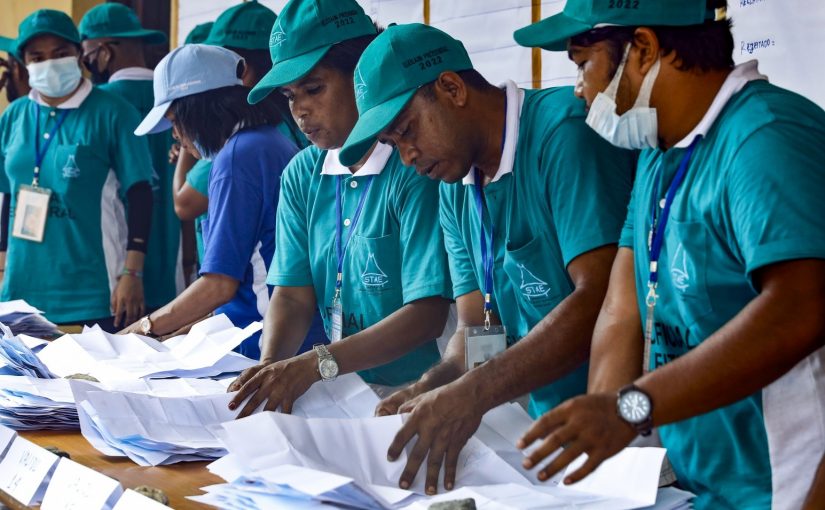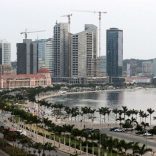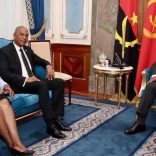Portugal: BPCE buys Novo Banco, group's entry into domestic retail
Timor-Leste: Half of presidential candidates got fewer than 5,000 votes

Photo: Lusa
According to provisional data, half of the Timorese presidential candidates failed to reach 5,000 votes, equivalent to the minimum number of supporters required to register and formalise their candidacy.
In the most competitive presidential election in Timor-Leste’s history with 16 candidates, the top five candidates accounted for over 92% of the votes cast. The remaining 11 had low support as counting drew to a close.
Apart from Anacleto Ferreira, who got about 2.1% of the vote, none of the others got more than 1.5%, with six getting less than half a percentage point of the valid votes. Ângela Freiras, the lowest-ranked, got just over 0.1% of the total.
Despite the low support, some of the defeated candidates are already saying who they will support in the second round. Others prefer to leave the choice to the conscience of their voters, and others are still waiting to consult the parties or structures that supported them.
Anacleto Ferreira, sixth in the poll, with 2.14% of the vote, told Lusa that as he was supported by the Democratic Party of the Republic of East Timor (PDRT), “the decision will have to be taken by the party”, possibly at a meeting in the next few days.
Milena Pires, one of the four women candidates, and the 10th in terms of votes, with 0.78%, told Lusa that she is still speaking to her team, but that, most likely, she will let her voters “decide for themselves and vote according to their conscience”.
Despite acknowledging the low number of votes, the former ambassador said she was not disappointed because, during the campaign, she managed to “influence some political agenda and convey the messages about the role of the president”.
“But this is only the first step, a beginning,” she told Lusa.
Isabel Ferreira, meanwhile, who came in at 0.63%, acknowledged to Lusa she was disappointed, especially noting that she didn’t even reach 5,000 votes from the supporters who signed up to register her candidacy.
“My candidacy was to gain more experience and to promote civic education. But I didn’t even expect to reach 5,000. More civic education is needed in this country,” she said.
The prime minister’s wife said that she would “support José Ramos-Horta”, considering him to be a leader that the country needs and whom she appeals to, if he wins, to “continue to maintain stability and peace to develop the country”.
The seventh most voted candidate, with 1.33% of the votes, Martinho Gusmão preferred not to declare who he would support, explaining that he would decide after he understood which of the two candidates would emphasise more what he considered to be a priority.
“In the second round, I think I’m just going to do my duty as a citizen, a man, a vote. And I will vote for a candidate in whom I see seriousness given to the issue of education”, he said, admitting, however, to still listen to the structure of the PUDD, the political force that supported him in the candidacy.
Felizberto Duarte, the 11th most voted candidate, but with only 0.41% of the votes, said that he still does not know who to vote for, noting that he had not received “any phone calls” from any of the candidates.
Further down the list was Rogério Lobato, who got only 0.26% of the votes, but who declared his support, in the second round, for José Ramos-Horta, considering him the best president for the present time.
“He is an international figure that will contribute to giving greater visibility in the international community to Timor-Leste. In these last years, Timor-Leste practically disappeared from the political map, and it is necessary to give more visibility through a person with the charisma and with an international reputation”, he told Lusa.
Virgílio Guterres, president of the Press Council and antepenultimate in the voting, said that he would ask his supporters to vote in conscience even though, personally, his support will not be given to those that “want to dissolve the parliament”, about José Ramos-Horta.
He stressed that the campaign was an opportunity to “get to know the population’s reality better and see that not enough had been done” in the last 20 years.
At the same time, he said, it was an opportunity to speak “face to face” with the leaders of the main political forces, seeking to “reduce the demagoguery of the great” and stressing that what won the elections was the “exploitation of the ignorance of the people”.
“They were speeches to manipulate feelings, for their demagogic capacities,” he said.
José Ramos-Horta is the most voted candidate, with 290,386 votes and 46.33% of the total, ahead of Francisco Guterres Lú-Olo with 22.29%, Armanda Berta dos Santos with 8.74%, Lere Anan Timur with 7.54% and Mariano Sabino with 7.3%.
After the end of polling by the Technical Secretariat for the Electoral Administration (STAE), there is still the final verification and validation process by the National Electoral Commission (CNE).













Leave a Reply
Be the First to Comment!
You must be logged in to post a comment.
You must be logged in to post a comment.